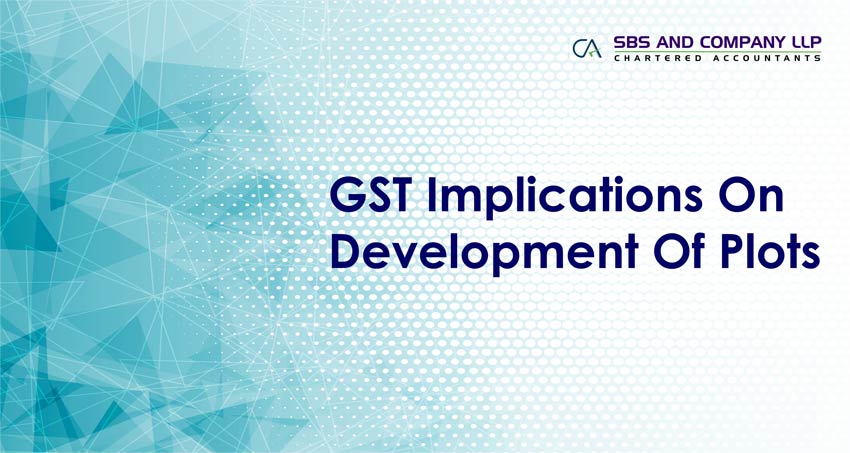Introduction:
This article is a continuation to our article in previous edition. In the previous article, we took up to deal the tax implications on development of plots, wherein, we have identified four transactions which are common to any development agreement:
Transaction I - Transfer of Development Rights (TDR) by landowner to developer
Transaction II - Construction Services provided by developer to landowner
Transaction III - Sale of Plots allotted to his share by developer
Transaction IV - Sale of Plots allotted to his shared by landowner
The tax implications on Transaction I and Transaction II are dealt in the previous article. Now, in this article, we wish to deal with tax implications on Transaction III and Transaction IV and conclude with our comments.
Sale of Plots allotted to his share by developer:
(Transaction – III)
Schedule III of the CT Act[1] provides for a list of transactions which are neither supply of goods nor supply of services. Transaction by way of sale of land is covered under entry 5 of schedule III of the CT Act which implies that the sale of land is excluded from the meaning and scope of supply.
In view of the above entry, transactions by way of sale of land get excluded from the ambit of supply. The developed plots are nothing but land. Hence, the transactions of sale of plots by developer would be out of the ambit of definition of ‘supply’ and accordingly no tax obligation exists. The payment of stamp duty on the entire consideration received from the customer also proves that the intent of the developer and customer is to deal in land and customer is not interested in taking services from the developer.
However, if the developer chose to pay stamp duty only on part of the consideration, stating that, the remaining is towards development charges, then there might arise a situation where in there is a potential scope for litigation. The tax authorities may state that since the stamp duty was not paid on the entire consideration, the intention among the developer and customer is not to deal in land alone but also for availing certain services from the developer and accordingly demand tax on the entire amounts received from customers at applicable rates.
However, the act of tax authorities demanding tax on the entire consideration is questionable, in absence of support from the provisions. Entry 5(b) of Schedule II states that construction of complex, building, civil structure or a part thereof, including a complex or building intended for sale to a buyer, wholly or partly, except where entire consideration has been received after issuance of completion certificate, where required, by competent authority or after its first occupation, whichever is earlier as supply of service.
Whether the said entry can be said to be applicable for plots also would be the question. Since the said entry deals with complex, building, civil structure or part thereof, whether a plot would fall under any of the above to make the plot also fit in Entry 5(b) of Schedule II?
In our view, an isolated plot which is subject matter of discussion may not fit in the description of complex, building or civil structure and accordingly would be out of the ambit of Entry 5(b). Further, assuming that plot is kind of civil structure or part thereof, since there would not be any issuance of completion certificate for plots, we can conclude that plots were never envisaged in this entry and accordingly, the collection of development charges may not fit under Entry 5(b).
However, the said activity may still be considered as ‘works contract’ for the customer and accordingly the development charges alone may be subjected to tax at the residuary rate of 18% applicable for ‘works contracts’. In our view, the demand of tax only on development charges would be more appropriate in law instead of tax on entire amount received from customer [assuming if the activity of plots also falls under Entry 5(b)].
Further, there would also be situations where advances have been received from the customer, but sale deeds were not entered. Such transactions would also be treated of sale of land, if the developer pays stamp duty on the entire value of consideration received from customers. If the developer has not discharged stamp duty on the entire consideration, then the tax implications as stated earlier would equally applicable. Only question that would arise, is at what point of time should developer discharge tax on the development services, since advance received is both towards land and development services. In our view, apportionment of advances first towards development services would be least litigative.
As far as credit is concerned, if the developer is paying stamp duty on the entire consideration, the tax paid on goods and input services will not be eligible since the output is neither a supply of goods nor services. However, if the developer is paying stamp duty on part of the consideration and paying tax on development charges, the tax paid on goods and input services can be availed.
Sale of Plots allotted to his share by landowner:
(Transaction – IV)
The tax implications in the hands of landowner are not much different from the developer. The entire discussion stated above would equally applicable here. In the previous article, while dealing with transaction of construction services provided by developer to landowner (Transaction II), we have stated that the tax has to be paid on such services. Since, that would be only the major credit, the eligibility of the same would depend upon whether the landowner pays stamp duty on the entire consideration or he choses to pay tax on development charges as discussed for developer.
Conclusion:
From this article and previous one, it is evident that there are certain issues which needs to be settled by intervention by CBIC to avoid any litigation.
[1]Central Goods & Services Tax Act, 2017



